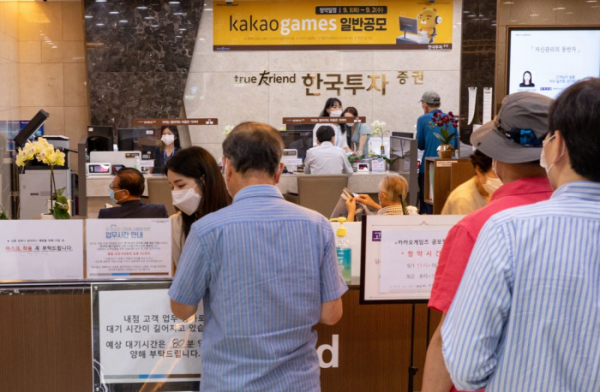Investor deposits for IPO subscriptions in S. Korea exceed W150tr
By Jie Ye-eunPublished : Sept. 14, 2020 - 15:03

South Korean investors have poured over 150 trillion won ($126.71 billion) into initial public offerings this year, 1.5 times more than last year, reflecting investors’ thirst for profit at a time of ultralow interest rates and high liquidity in the market, industry sources said Monday.
Investor deposits for IPO subscription in the local market came to 150.9 trillion won from January to Thursday. In contrast, the figure for the whole of last year stood at 99.4 trillion won.
Despite the massive amount of funds injected into the IPO market this year, the number of firms that went public this year was only 45, compared with 99 a year earlier. This year’s amount also far outweighs the 85 trillion won in subscription deposits for 98 IPOs seen in 2018.
Starting with an IPO by drug developer SK Biopharmaceuticals, local investors flocked to new stock sales. In the firm’s two-day retail tranche in June, the deposit payments amounted to 30.98 trillion won.
Gaming firm Kakao Games also set a record in the nation’s IPO history, attaining 58.55 trillion won in subscription deposits during its two-day preorder session Sept. 1-2.
Market and industry watchers forecast that IPO subscription deposits would surpass 200 trillion won, hitting an all-time high as more big-name firms such as Big Hit Entertainment, the label of K-pop superstar boy band BTS, wait in line to go public.
The experts attributed investors’ rush to the local IPOs to their rich liquidity and growing interest in stock investments due to a lack of investment destinations that promise decent returns amid record low interest rates.
Considering the Moon Jae-in administration’s recent policies -- such as stringent real estate regulations, stock transaction tax cuts and the “Korean New Deal” initiative -- more liquidity is expected to flow into the market as investors’ interest is likely to remain high until next year, they added.
“The government seems to be mapping out a package of measures to funnel excess liquidity into the local stock market. As was seen through subscription results, retail investors’ interest in the market is pretty high that they spontaneously make stock investments,” said Lim Hee-yeon, an analyst at Shinhan Investment.
By Jie Ye-eun (yeeun@heraldcorp.com)










![[Kim Seong-kon] Democracy and the future of South Korea](http://res.heraldm.com/phpwas/restmb_idxmake.php?idx=644&simg=/content/image/2024/04/16/20240416050802_0.jpg&u=)









![[Today’s K-pop] Zico drops snippet of collaboration with Jennie](http://res.heraldm.com/phpwas/restmb_idxmake.php?idx=642&simg=/content/image/2024/04/18/20240418050702_0.jpg&u=)